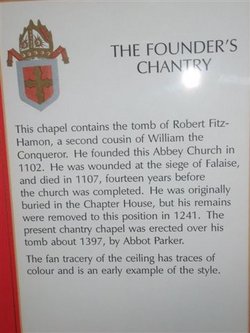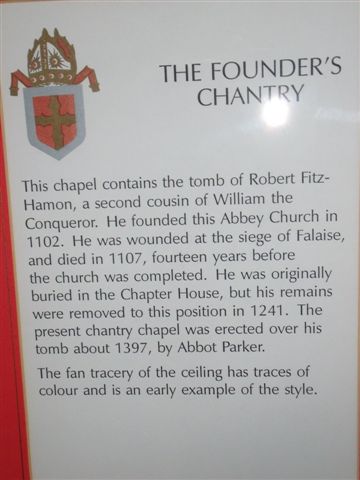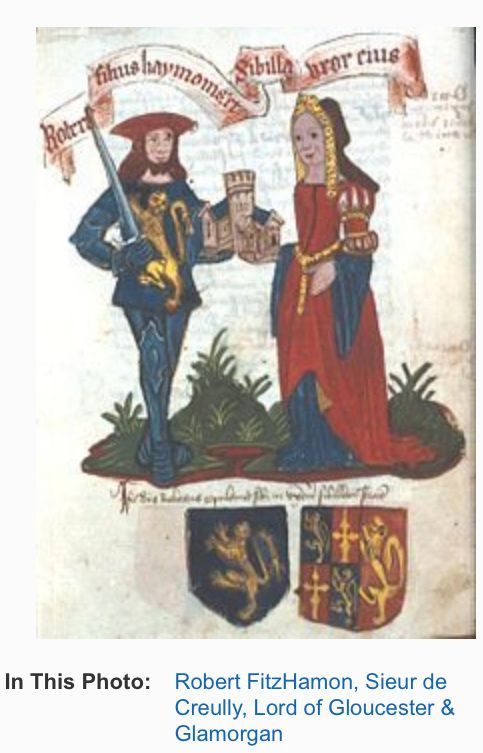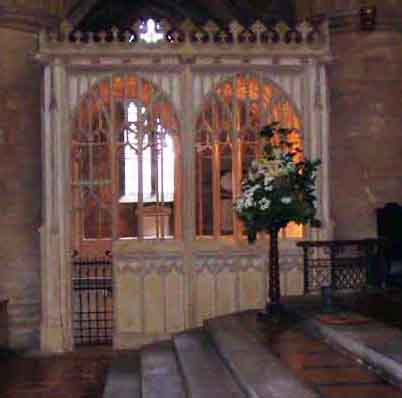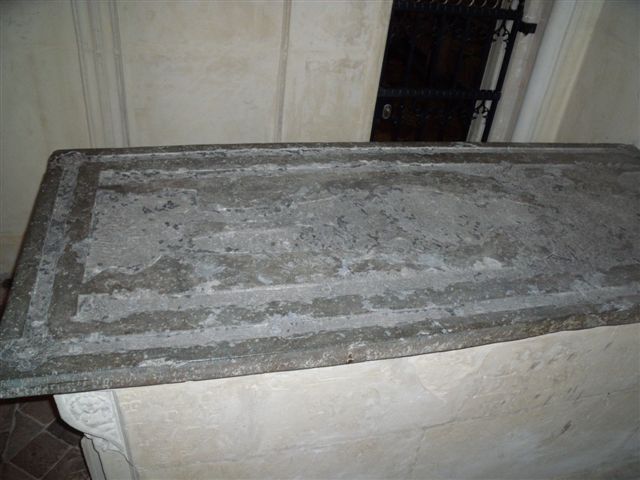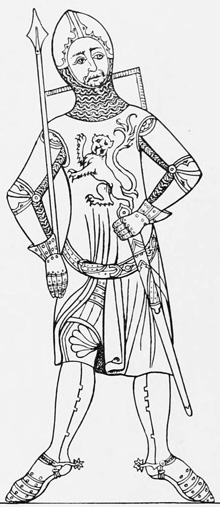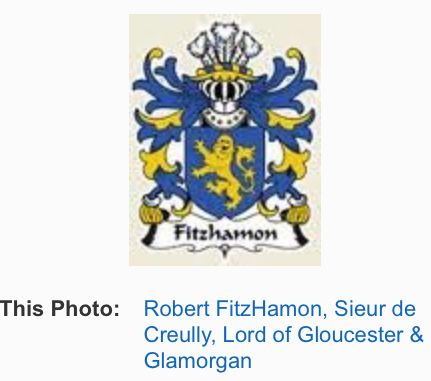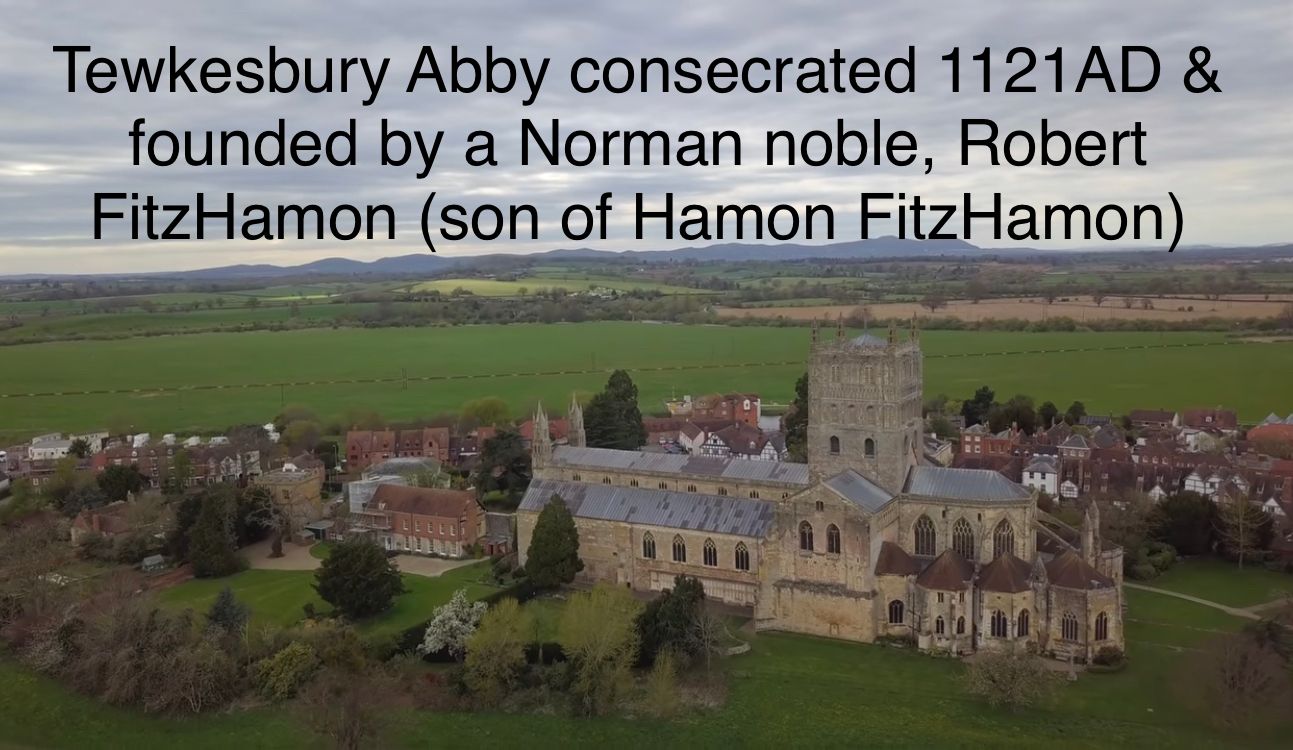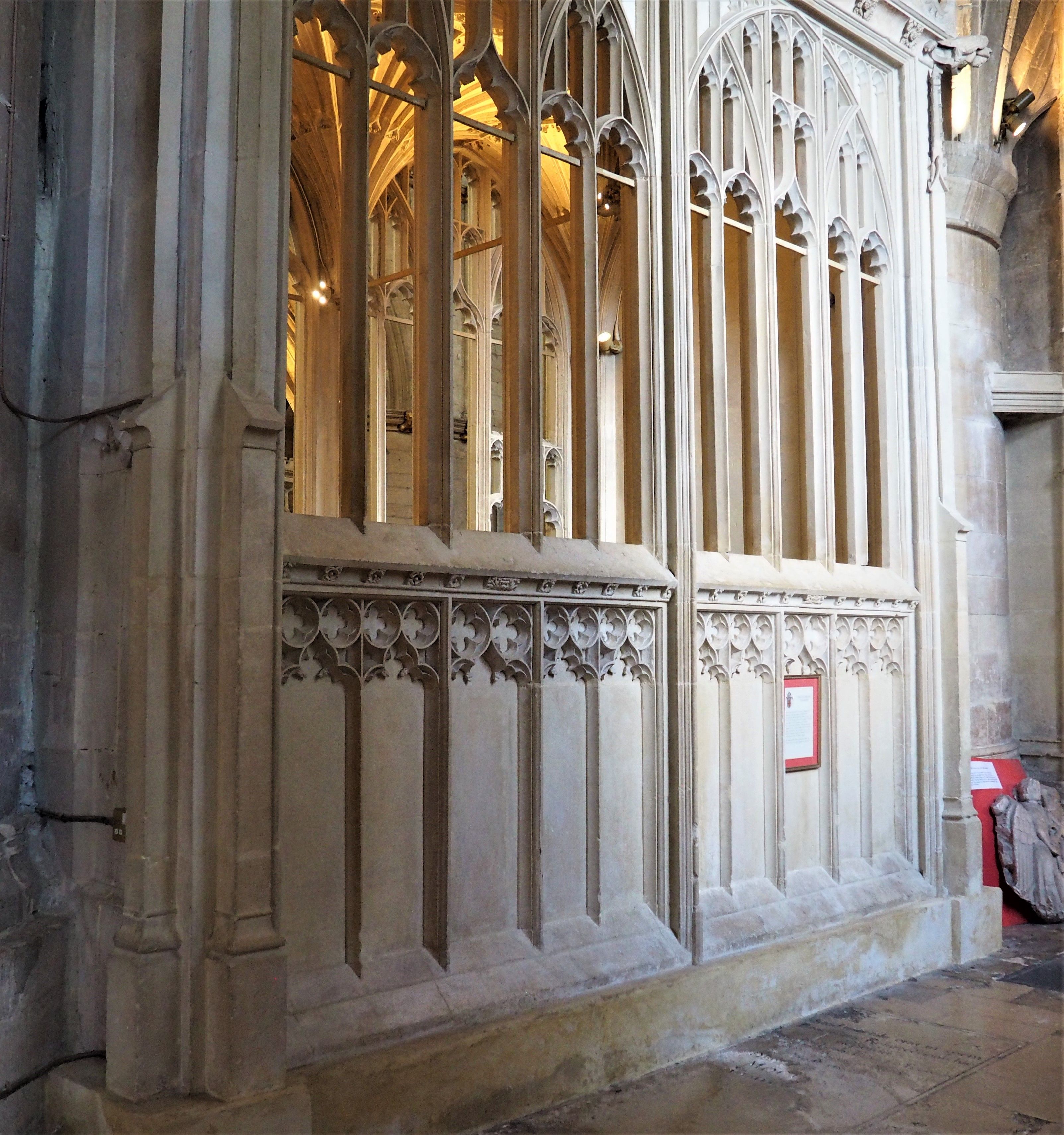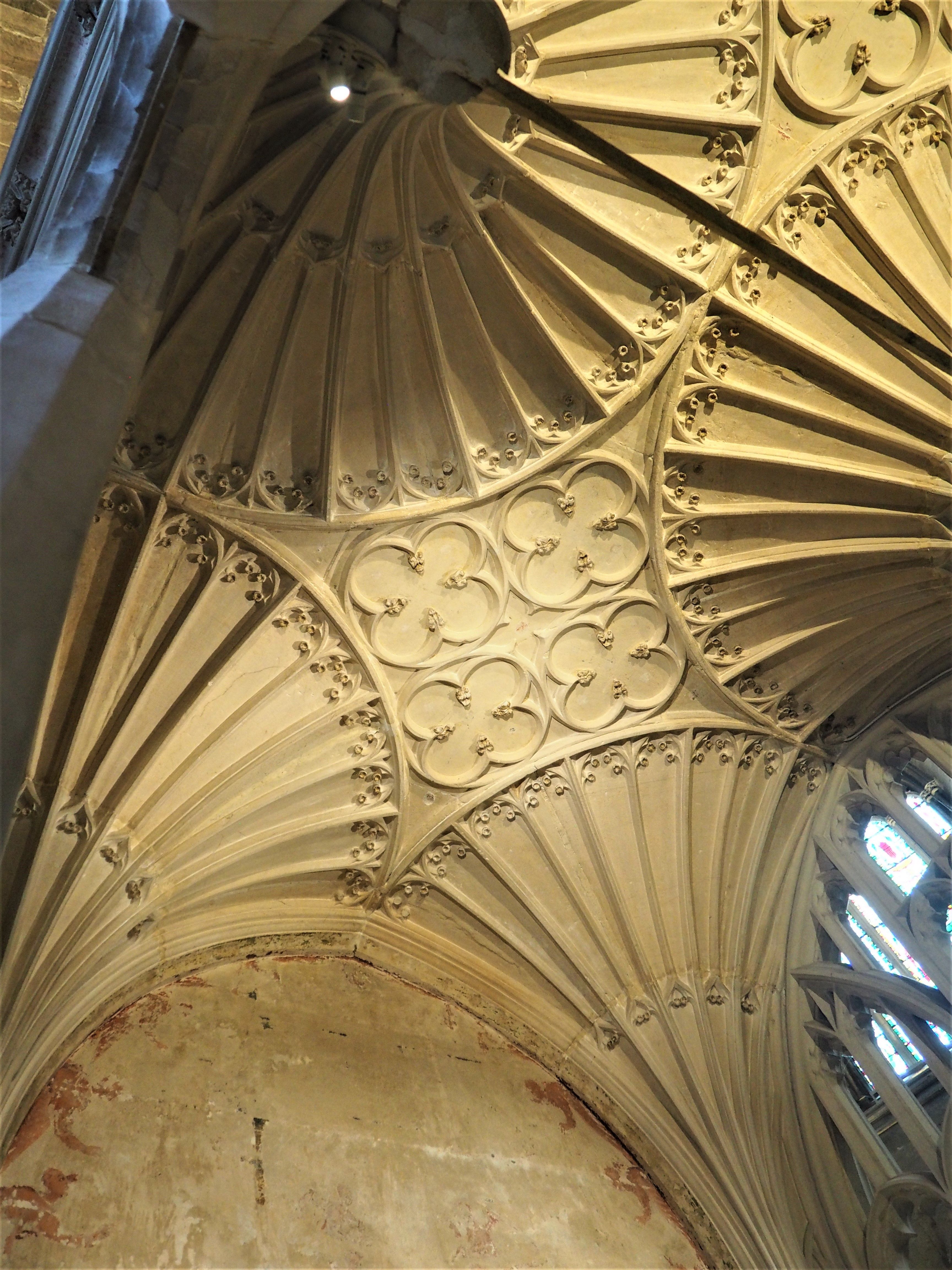He was a kinsman of William the Conqueror and one of the few Anglo-Norman barons to remain loyal to the two successive kings William Rufus and Henry I of England, he was a prominent figure in England and Normandy.
He was the son of Haimo the Sheriff of Kent and grandson of Haimo Dentatus (probably buck-toothed).
He first comes to prominence as a supporter of William Rufus during the Rebellion of 1088. After the revolt failed he was rewarded with great estates in Gloucestershire and elsewhere. Some of these had belonged to the late Queen Matilda, and were supposed to be inherited by Rufus's younger brother Henry (the future Henry I); nevertheless Fitzhamon remained on good terms with Henry.
In 1105 he went to Normandy and was captured while fighting near his ancestral estates near Bayeux. This was one of the reasons Henry crossed the channel with a substantial force later that year. Fitzhamon was freed, and joined Henry's campaign, which proceeded to besiege Falaise. There Fitzhamon was severely injured in the head; although he lived two more years he was never the same mentally. He was buried in the Chapter House at Tewkesbury Abbey, which he had founded and considerably enriched during his lifetime.
Robert married Sybil de Montgomery around 1087, probably the youngest daughter of Roger de Montgomery, 1st Earl of Shrewsbury by his first wife Mabel Talvas, daughter of William I Talvas, by whom he is said to have had four daughters. His eldest daughter Mabel inherited his great estates and married Robert de Caen, 1st Earl of Gloucester around 1107.
Another daughter Isabella is said to have been married to a count from Brittany, but no further details exist. His widow and two other daughters (unnamed) are reported to have entered a convent.
Robert Fitzhamon's great granddaughter Isabel of Gloucester married John of England.
******************************
Many notable church monuments surviving in Tewkesbury Abbey include:
* 1107 - when the abbey's founder Robert Fitzhamon died in 1107, he was buried in the chapter house while his son-in-law Robert FitzRoy (aka Robert de Caen, an illegitimate son of King Henry I), Earl of Gloucester, continued building the abbey
* 1375 - Edward Despenser, Lord of the Manor of Tewkesbury, is remembered today chiefly for the effigy on his monument, which shows him in full color kneeling on top of the canopy of his chantry, facing toward the high altar
* 1395 - Robert Fitzhamon's remains were moved into a new chapel built as his tomb
* 1471 - a brass plate on the floor in the center of the sanctuary marks the grave of Edward of Westminster, Prince of Wales, the son of King Henry VI and end of the Lancaster line, who was killed in the Battle of Tewkesbury - the only Prince of Wales ever to die in battle.
* 1477 - the bones of George, "Butt of Malmsey" Clarence, (brother of Edward IV and Richard III) and his wife Isabelle (daughter of Richard "the Kingmaker" Neville) are housed behind a glass window in a wall of their inaccessible burial vault behind the high altar
* 1539 - the cadaver monument which Abbot Wakeman had erected for himself is only a cenotaph, because he was not buried there
* Also buried in the abbey are several members of the Despenser, de Clare and Beauchamp families, all of whom were generous benefactors of the abbey and also my ancestors
He was a kinsman of William the Conqueror and one of the few Anglo-Norman barons to remain loyal to the two successive kings William Rufus and Henry I of England, he was a prominent figure in England and Normandy.
He was the son of Haimo the Sheriff of Kent and grandson of Haimo Dentatus (probably buck-toothed).
He first comes to prominence as a supporter of William Rufus during the Rebellion of 1088. After the revolt failed he was rewarded with great estates in Gloucestershire and elsewhere. Some of these had belonged to the late Queen Matilda, and were supposed to be inherited by Rufus's younger brother Henry (the future Henry I); nevertheless Fitzhamon remained on good terms with Henry.
In 1105 he went to Normandy and was captured while fighting near his ancestral estates near Bayeux. This was one of the reasons Henry crossed the channel with a substantial force later that year. Fitzhamon was freed, and joined Henry's campaign, which proceeded to besiege Falaise. There Fitzhamon was severely injured in the head; although he lived two more years he was never the same mentally. He was buried in the Chapter House at Tewkesbury Abbey, which he had founded and considerably enriched during his lifetime.
Robert married Sybil de Montgomery around 1087, probably the youngest daughter of Roger de Montgomery, 1st Earl of Shrewsbury by his first wife Mabel Talvas, daughter of William I Talvas, by whom he is said to have had four daughters. His eldest daughter Mabel inherited his great estates and married Robert de Caen, 1st Earl of Gloucester around 1107.
Another daughter Isabella is said to have been married to a count from Brittany, but no further details exist. His widow and two other daughters (unnamed) are reported to have entered a convent.
Robert Fitzhamon's great granddaughter Isabel of Gloucester married John of England.
******************************
Many notable church monuments surviving in Tewkesbury Abbey include:
* 1107 - when the abbey's founder Robert Fitzhamon died in 1107, he was buried in the chapter house while his son-in-law Robert FitzRoy (aka Robert de Caen, an illegitimate son of King Henry I), Earl of Gloucester, continued building the abbey
* 1375 - Edward Despenser, Lord of the Manor of Tewkesbury, is remembered today chiefly for the effigy on his monument, which shows him in full color kneeling on top of the canopy of his chantry, facing toward the high altar
* 1395 - Robert Fitzhamon's remains were moved into a new chapel built as his tomb
* 1471 - a brass plate on the floor in the center of the sanctuary marks the grave of Edward of Westminster, Prince of Wales, the son of King Henry VI and end of the Lancaster line, who was killed in the Battle of Tewkesbury - the only Prince of Wales ever to die in battle.
* 1477 - the bones of George, "Butt of Malmsey" Clarence, (brother of Edward IV and Richard III) and his wife Isabelle (daughter of Richard "the Kingmaker" Neville) are housed behind a glass window in a wall of their inaccessible burial vault behind the high altar
* 1539 - the cadaver monument which Abbot Wakeman had erected for himself is only a cenotaph, because he was not buried there
* Also buried in the abbey are several members of the Despenser, de Clare and Beauchamp families, all of whom were generous benefactors of the abbey and also my ancestors
